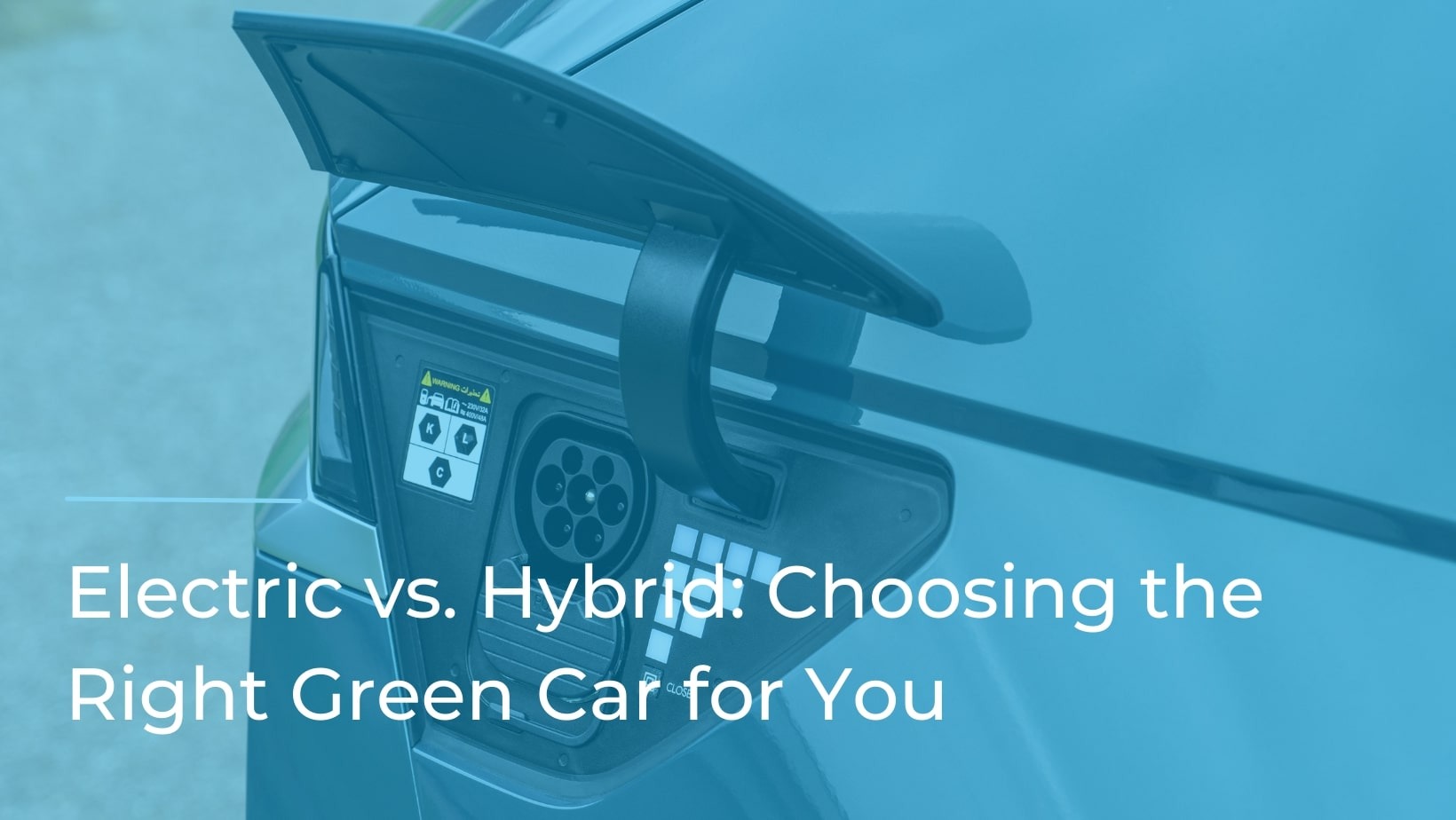Electric vs. Hybrid: Choosing the Right Green Car for You
As we strive to reduce our carbon footprint and combat climate change, the importance of embracing greener transportation options becomes increasingly evident.
Among the various eco-friendly choices available, electric and hybrid vehicles have gained significant attention and popularity. These innovative cars offer a more sustainable alternative to traditional petrol and diesel vehicles, contributing to cleaner air and a healthier planet.
If you're considering making the switch to a green car but find yourself torn between electric and hybrid, this blog is here to help. We will delve into the world of electric and hybrid cars, exploring their features, benefits, and considerations, all with the aim of assisting you in making an informed decision.
Hybrid Cars
Hybrid cars present another viable option for eco-conscious drivers seeking to reduce their environmental impact. These vehicles combine an internal combustion engine (ICE) with an electric motor and battery, blending the benefits of both technologies. Understanding hybrid cars and their various types can help you determine if they are the right choice for you.
Hybrid cars come in different forms, with the most common type being the parallel hybrid. In a parallel hybrid, both the engine and electric motor work together to propel the vehicle. The electric motor assists the engine during acceleration and operates independently at low speeds or when cruising, leading to improved fuel efficiency and reduced emissions.
Another type is the series hybrid, where the engine acts as a generator to charge the battery, which then powers the electric motor that drives the wheels. In this configuration, the engine does not directly power the vehicle, making it more efficient for urban driving or situations that require frequent stopping and starting.
A third option is the plug-in hybrid (PHEV), which allows for external charging of the battery, similar to an electric car. This feature extends the electric-only driving range and reduces reliance on the engine. Plug-in hybrids offer the flexibility of running on electricity for shorter trips while having the ability to rely on the engine for longer journeys, eliminating range anxiety.
Hybrid cars offer several advantages that make them appealing to a wide range of drivers. Firstly, they reduce fuel consumption and emissions compared to conventional petrol or diesel vehicles. The combination of the engine and electric motor allows for more efficient use of energy, resulting in improved fuel economy and a smaller carbon footprint.
Additionally, hybrid cars offer a wider driving range compared to electric cars. As they can rely on the engine, there is no need to worry about running out of battery charge during longer trips. This feature provides a sense of convenience and eliminates the need for frequent charging infrastructure.
Hybrid Car Considerations
When considering hybrid car ownership, it's important to keep in mind a few considerations. Firstly, while hybrid cars emit fewer emissions than conventional vehicles, they still rely on fossil fuels to some extent. Therefore, they may not provide the same level of environmental benefits as electric cars in terms of zero tailpipe emissions.
Maintenance costs for hybrid cars are generally higher than for electric cars due to the presence of both an engine and electric components. However, they are still generally lower than those of conventional vehicles, thanks to regenerative braking and reduced wear on the engine.
Another consideration is the availability of charging infrastructure. While hybrid cars do not rely heavily on charging stations like electric cars, having the option to plug in and charge the battery can be advantageous, especially for maximising fuel economy and reducing emissions during shorter trips.
By exploring the different types of hybrid cars and understanding their advantages and considerations, you can make an informed decision about whether a hybrid vehicle aligns with your lifestyle and environmental goals. In the next section, we will delve deeper into the factors you should consider when choosing between electric and hybrid cars.
Hybrid vs Electric
When it comes to choosing between an electric car and a hybrid car, several factors should be taken into account. Evaluating these factors will help you make an informed decision that aligns with your individual needs, driving patterns, and sustainability goals.
First and foremost, consider your driving patterns and commuting needs. Electric cars are well-suited for daily commutes and shorter trips, especially if you have access to convenient charging options at home or work. On the other hand, if you frequently embark on long journeys or have limited access to charging infrastructure, a hybrid car with its extended driving range and the ability to rely on the engine can provide more flexibility.
Your environmental impact and sustainability goals are also crucial considerations. If reducing your carbon footprint is a top priority, electric cars offer the advantage of zero tailpipe emissions.
By choosing an electric car, you can significantly contribute to cleaner air and a greener future. However, if you are unable to rely solely on electric power due to driving requirements or charging constraints, a hybrid car can still offer lower emissions and better fuel efficiency compared to conventional vehicles.
Budget and cost considerations play a significant role in the decision-making process. Electric cars generally have higher upfront costs due to battery technology and manufacturing expenses. However, they offer potential long-term savings on fuel costs and reduced maintenance needs. Hybrid cars, while typically more affordable than electric cars, may have higher maintenance costs compared to their fully electric counterparts due to the presence of an engine. It's essential to weigh the initial investment against potential savings over the vehicle's lifespan.
The availability of charging infrastructure is another factor to consider. Electric cars heavily rely on charging stations, and their convenience and accessibility vary depending on your location. Before opting for an electric car, ensure that you have access to a reliable charging network, either through public charging stations or the ability to install a home charging unit. Hybrid cars, on the other hand, do not require extensive charging infrastructure, making them more convenient for drivers with limited charging options.
Resale value and long-term investment should also be taken into account. The electric vehicle market is evolving rapidly, with advancements in technology and improvements in range and charging infrastructure. As a result, electric cars may retain their value better over time compared to hybrid cars. It's worth researching the resale values of different models and considering the potential impact of emerging technologies on the future value of your chosen vehicle.
Lastly, explore the availability of incentives, tax credits, and grants. Many governments and local authorities provide financial incentives to promote the adoption of electric and hybrid vehicles. These incentives can include tax credits, rebates, or grants that significantly reduce the upfront costs of purchasing a green car. Research the incentives available in your area to determine if they can further offset the initial investment and make electric or hybrid cars more financially attractive.
By considering these factors, you can assess your personal needs, priorities, and preferences to determine whether an electric car or a hybrid car is the right choice for you. In the next section, we will compare electric and hybrid cars in key areas to help you make a more informed decision.
Choosing the right green car, whether electric or hybrid, is a significant decision that requires careful consideration. Electric cars offer zero tailpipe emissions, exceptional energy efficiency, and a smooth driving experience, making them an excellent choice for urban commuting and shorter trips. Hybrid cars, on the other hand, provide the advantage of a longer driving range and the flexibility of relying on both the engine and electric motor.
When making your decision, it's crucial to evaluate factors such as your driving patterns, environmental impact, budget, charging infrastructure availability, and personal preferences. Electric cars are ideal for those with access to charging infrastructure and shorter daily commutes, while hybrid cars are more suitable for individuals who require the flexibility of longer trips without relying solely on charging infrastructure.
Consider the long-term costs of ownership, including fuel expenses and maintenance, as well as the potential environmental benefits of each option. Electric cars have higher upfront costs but offer potential savings on fuel and maintenance, while hybrid cars generally have lower upfront costs but may require more maintenance due to the presence of an engine.
Choosing between Hybrid and Electric
When choosing between an electric car and a hybrid car, it's essential to compare them in several key areas to understand their differences and determine which option aligns best with your requirements. Let's examine these areas of comparison:
Fuel efficiency and energy consumption: Electric cars are known for their exceptional energy efficiency. They convert a higher percentage of stored energy into actual propulsion, resulting in lower energy consumption and reduced reliance on fossil fuels.
Hybrid cars also offer improved fuel efficiency compared to traditional petrol or diesel vehicles, thanks to their hybrid powertrain and regenerative braking capabilities. However, electric cars still have the upper hand in terms of overall energy efficiency and zero tailpipe emissions.
Environmental impact and carbon footprint: Electric cars have a clear advantage in terms of environmental impact. With zero tailpipe emissions, they contribute significantly to reducing greenhouse gas emissions and air pollution.
Hybrid cars also provide a lower carbon footprint compared to conventional vehicles due to their improved fuel efficiency. However, they cannot match the zero-emission benefits of electric cars. If reducing your environmental impact is a priority, electric cars are the more eco-friendly choice.
Performance and driving experience: Electric cars offer instant torque from the moment you press the accelerator, delivering quick and smooth acceleration. They provide a quiet and refined driving experience, free from engine noise and vibrations.
Hybrid cars, while offering improved fuel efficiency, may not provide the same level of instant torque and acceleration as electric cars. However, they still offer a comfortable and enjoyable driving experience, particularly for daily commuting and urban driving.
Range and charging options: Range anxiety, the fear of running out of battery charge, is a concern for some electric car owners. However, electric cars have made significant progress in range capabilities, with some models offering over 300 miles on a single charge. Hybrid cars, on the other hand, do not face range limitations as they can rely on the engine for extended trips.
Electric cars require access to charging infrastructure, which includes home charging units and public charging stations, whereas hybrid cars can rely on refuelling at petrol stations.
Maintenance and repair costs: Electric cars have fewer moving parts compared to traditional petrol or diesel vehicles, resulting in lower maintenance needs. They don't require oil changes or frequent servicing of complex engine components. Hybrid cars, while generally more reliable than conventional vehicles, still have an engine that requires regular maintenance.
Electric cars also tend to have longer-lasting brakes due to regenerative braking, reducing the need for brake replacements. Overall, electric cars offer lower maintenance and repair costs compared to both hybrid and conventional vehicles.
Affordability and total cost of ownership: Electric cars usually have higher upfront costs due to the expensive battery technology. However, they can be more affordable to own and operate in the long run due to lower fuel costs and reduced maintenance needs.
Hybrid cars tend to have lower upfront costs compared to electric cars, making them a more budget-friendly option. However, their total cost of ownership, including fuel and maintenance expenses, may be higher than that of electric cars.
By comparing electric and hybrid cars in these key areas, you can assess which factors are most important to you and make an informed decision. Consider your driving patterns, environmental goals, budget, and overall preferences to determine whether an electric car or a hybrid car is the right choice for you.
In the next section, we will provide real-life examples and testimonials from owners of electric and hybrid cars to further assist you in your decision-making process.
Incentives and Grants
Additionally, take into account the availability of incentives, tax credits, and grants that can further offset the costs of purchasing a green car. Many governments and local authorities provide financial incentives to encourage the adoption of electric and hybrid vehicles, making them more financially attractive options.
Ultimately, the choice between an electric car and a hybrid car depends on your unique circumstances and priorities. Both options contribute to reducing greenhouse gas emissions and promoting sustainable transportation. By embracing a green car, you are actively participating in the global effort to combat climate change and create a cleaner future for generations to come.
Whichever path you choose, remember that the transition to green mobility is a significant step towards a more sustainable world. Embrace the benefits of reduced emissions, improved fuel efficiency, and a greener driving experience. The choice between electric and hybrid cars empowers you to make a positive impact on the environment while enjoying the benefits of modern and eco-friendly transportation.
If you would like to discuss your electric or hybrid options with our friendly team, speak to your local Hyundai dealer, RN Golden today.





